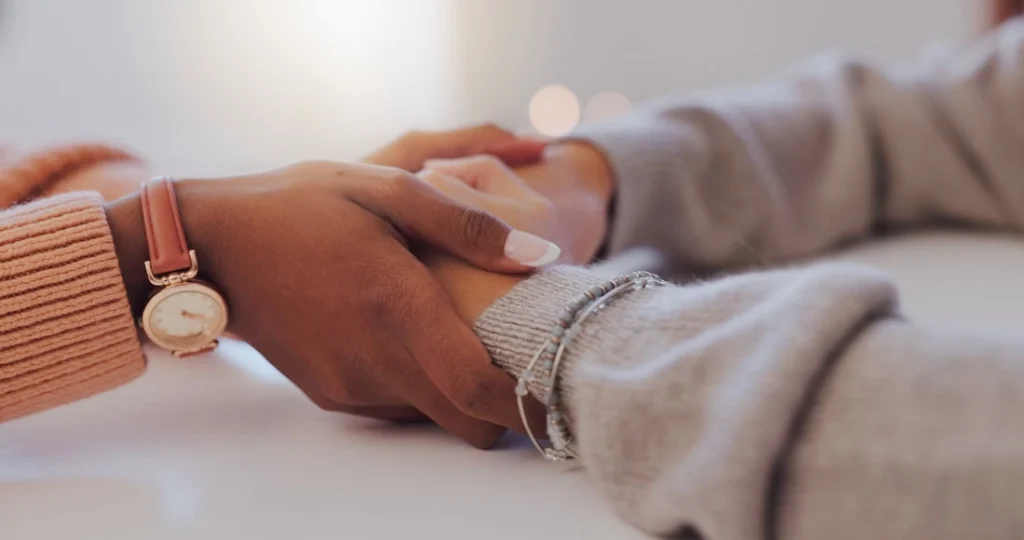The role of listening in the recovery process is profound. It is a vital component of healing and building stronger relationships. When you learn to truly listen to others, you can learn how to better navigate your recovery and boost your well being.
The Role of Listening in the Recovery Process
When you work with the right type of treatment center, you will experience the role that listening has on your recovery, not just in terms of the skills you build but also in how you are treated and received by staff. The right staff and treatment center can provide the following:
- Warmth and kindness
- Deep listening
- Social connection
Using a person-centered care can support higher quality outcomes while deep listening can ensure staff and other clients deeply understand your background, what distresses you might have, and how to improve treatment outcomes.
The more staff members and clients alike practice active listening, the stronger the social connection becomes, with new levels of emotional support and new friendships. This can help clients succeed in their treatment plans and long term sobriety too.
Active listening is a fundamental part of any communication. The role of listening in the recovery process is about fostering a connection that truly matters, avoiding anxiety and judgment, and building a profound connection when you need it most.

3 Tools for Listening in the Recovery Process
When you enter rehab, you will be challenged to learn about listening in the recovery process, not just how important it is, but how to do it.
#1: Be Present in the Moment
It can be very difficult to handle stress, anxiety, and other fleeting thoughts, especially at the beginning of the recovery. However, when you are participating in a support group session or meeting a therapist, you can practice giving the speaker your complete attention by:
- Maintaining eye contact
- Avoiding disruptions like cutting them off or looking at a phone
- Using facial expressions and head nods to indicate listening
When you are present in the moment you are not only able to better handle stress, reduce anxiety or depression, but you open yourself up to learning from other people, things that may be imperative to your recovery whether now or in the future.
#2: Be Aware of Your Body
When you are distracted and you aren’t listening in the recovery process, you might not realize it but your body will show it. The way you sit, where your arms are positioned, and so forth is a big indicator of whether or not you are actually listening.
When you are listening to other people, whether it’s a therapist, a doctor, or another member of a support group, be aware of the following:
- Don’t cross your arms even if you are doing so for seemingly innocuous reasons, as this can be interpreted as disinterest in what is being said or even defensiveness and anger
- Try to keep an open posture rather than collapsing in on yourself, as this conveys your openness and receptivity to what is being said
You don’t have to sit in a way that’s uncomfortable for you, but try to face whoever is speaking, even if that means shifting in your chair or turning a bit to one side or the other to acknowledge someone next to you.
#3: Reflect and Avoid Judgment
When you are listening in recovery, it’s very easy to jump to conclusions, or make immediate assumptions about one part of what someone is saying. When this happens, it interferes with any form of active listening and can inhibit your ability to understand what the other person is actually trying to say.
That it’s why it is important that you set aside any biases you might have to approach each conversation with a therapist, team member, or other client with an open mind.
Learning to Listen with Sequoia Recovery
At Sequoia Recovery, we know that the role of listening in the recovery process is significant. That is why we encourage active listening to enhance your personal growth, relationships, and enrich your overall success in sobriety.
At our treatment center we work with each client no matter the level of care they need. You can start with a detox and residential program or transition to a flexible outpatient program depending on your schedule and your needs.
Whatever works best for your circumstances, our team will incorporate a better understanding of being present and learning to listen. You can trust that each team member works hard to ensure you receive active listening from them as well.
Reach out to us today to learn more about listening in the recovery process and how this can help you progress. Call Sequoia Recovery today.
FAQs
What is active listening?
Active listening is a skill that promotes better communication, helps you build empathy, and has the potential to transform you in your recovery. Whether in your personal or professional life, the more you practice active listening in the recovery process, the better you will be able to foster compassion toward one another, build a trusting environment with people like your therapist or other members of a support group, and develop meaningful connections with friends or family.
How does listening help with relationships in recovery?
When you practice things like active listening, it validates the experiences that others have. For example, if you practice active listening with a close family member, you might not necessarily agree with what they have to say about your past behaviors, but you can build trust with them and understand where they are coming from.
Does listening in recovery help you with sobriety?
Absolutely, it can. When you practice active listening, you learn to better understand the emotions and perspectives of other people. This can help you gain compassion, making it easier to be compassionate toward yourself or forgive yourself while also supporting others along your recovery journey.
The more you clarify what other people are saying, the more likely you are to feel comfortable opening up and exploring your own emotions as well which could lead to a lot of personal growth, better emotional regulation and communication. All of this can help you with your sobriety by doing away with things such as jumping to conclusions which might trigger difficult emotions and destructive behaviors.
Are you supposed to talk when you are using active listening in the recovery process?
There is no right or wrong answer here. Just because you are trying to listen to others doesn’t mean you shouldn’t talk at all. You certainly should avoid disrupting them or interrupting them unnecessarily, but it’s important that you offer support and validation when someone shares something so that they know they have been heard and understood.
Consider your responses in light of how you might appreciate constructive feedback, kindness, support, or empathy from others.
What role does listening play in the recovery process?
Listening helps you improve your communication, demonstrating that you respect what other people are feeling and what they are sharing. This helps you create a safe space, whether in a support group meeting, with a therapist, or at home.
The role of listening in the recovery process will strengthen your relationships, making it easier for people you have wronged to feel understood and for you to express your feelings when you need support and a space to heal.
The more you understand the role of listening, the better able you will be to step into someone else’s experiences, appreciate what they have gone through, and respond with compassion.

